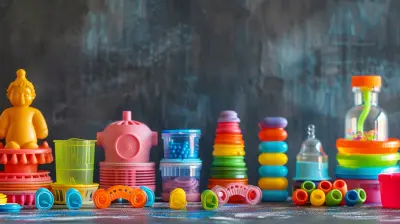Teaching Your Child Responsibility Without Resorting to Nagging
25 October 2025
Raising responsible kids is every parent's goal, but let's be real—getting them to pick up after themselves, do their homework, or complete chores without nagging can feel downright impossible. You ask once, twice, three times, and before you know it, you're caught in an endless cycle of reminders that fall on deaf ears. Sound familiar?
The good news is that there’s hope! You don’t need to turn into a broken record to teach your child responsibility. Instead of nagging (which, let’s face it, they start tuning out), you can use smarter strategies to instill responsibility, encourage independence, and build good habits that last a lifetime. Let’s dive into how you can do this without losing your sanity. 
Why Nagging Doesn’t Work
Before we get into the solutions, let’s address the elephant in the room—why nagging isn’t the answer.- Kids Tune It Out – The more we repeat ourselves, the less they hear us. Nagging turns into background noise, and eventually, they just ignore it.
- It Creates Resentment – Nobody likes being constantly reminded to do something. Your child may start associating responsibility with negativity instead of developing the internal motivation to do it.
- It Teaches Dependence – If kids only act because they’re being told (or nagged) to, they never learn to hold themselves accountable.
So, if nagging doesn’t work, what does? Let’s talk about the strategies that actually make a difference. 
1. Set Clear Expectations from the Start
Imagine going to a new job with no job description—how would you know what’s expected of you? Kids feel the same way when they're asked to be responsible without clear guidance.- Clearly define what responsibility looks like in your home.
- Use simple language to set expectations: “After dinner, your job is to put your plate in the sink.”
- Be consistent—if the rules change day by day, they’ll struggle to know what to do.
When expectations are crystal clear, it removes the gray areas and excuses. 
2. Give Them Ownership
Kids love to feel capable and independent. When you involve them in decision-making, they take more pride in their responsibilities.- Instead of assigning chores randomly, let them choose between a few tasks. “Do you want to set the table or take out the trash?”
- Give them control over their schedule. Let them decide when to do homework—before dinner or after?
- Praise effort, not just results. When they try (even if it’s not perfect), acknowledge their independence.
When children feel trusted to make choices, they take their responsibilities more seriously. 
3. Establish Routines
Routines make responsibility second nature. Kids are more likely to follow through when tasks become part of their daily habits instead of one-off requests.- Morning routine: Make brushing teeth, making beds, and packing school bags automatic.
- After-school routine: Set homework or reading time before screen time.
- Nighttime routine: Involve them in getting ready for bed—picking up toys, setting out tomorrow’s clothes, etc.
With routines in place, responsibilities become habits—no nagging needed.
4. Use Natural Consequences
Nothing teaches responsibility better than natural consequences. Instead of nagging, let real-life teach the lesson.- If they forget their homework, don’t rush to school to bring it. Let them experience the consequence of not turning it in.
- If they don’t put their laundry in the hamper, they won’t have clean clothes when they need them.
- If they leave their toys outside, they might get ruined by the weather.
These lessons may be tough, but they teach accountability far better than constant reminders ever will.
5. Make Responsibility Fun
Let’s face it—chores and responsibilities don’t sound exciting to kids. But turning them into a game can completely change their attitude.- Beat the clock: Set a timer and challenge them to finish before it runs out.
- Chore chart & rewards: Let them track their progress with stickers or points leading to a small reward.
- Music motivation: Play their favorite songs while they clean up—it makes tasks more enjoyable.
Responsibility doesn’t have to feel like punishment. When you add some fun, kids are much more willing to participate.
6. Be a Role Model
Children learn more from what you do than what you say. If they see you taking responsibility without complaining, they’ll be more likely to do the same.- Keep your own commitments—if you say you’ll do something, follow through.
- Show them how you manage responsibilities, like paying bills on time or tidying up without being asked.
- Let them see that responsibility isn’t a burden but a normal part of life.
Leading by example is one of the most powerful ways to teach responsibility without ever saying a word.
7. Avoid Bailouts
It’s hard to watch our kids struggle, but constantly rescuing them prevents them from learning responsibility.- If they forget something important, don’t rush to fix it for them.
- When they make a mess, hold them accountable for cleaning it up.
- Let them handle their own conflicts when appropriate, instead of jumping in to save the day.
Allowing kids to face the consequences of their actions teaches them responsibility far more effectively than protecting them from every mistake.
8. Reinforce with Positive Reinforcement
Nagging focuses on what kids aren’t doing. Instead, shift the focus to what they’re doing right.- Praise them when they show responsibility: “I love how you put your shoes away without being asked!”
- Offer small rewards like extra playtime or choosing a family activity.
- Recognize their effort—even if it’s not perfect.
Positive reinforcement builds their confidence and makes them want to continue being responsible.
9. Teach Problem-Solving Skills
Sometimes, kids avoid responsibilities because they don’t know how to handle them. Teaching problem-solving builds their confidence to take responsibility on their own.- If they struggle with homework, don’t just give the answers—ask, “What do you think we should do?”
- If they forget their lunch, ask, “How can we make sure this doesn’t happen again?”
- Encourage them to think through solutions rather than relying on you to fix everything.
Helping kids develop problem-solving skills equips them to take responsibility without constant direction.
10. Be Patient & Give It Time
Teaching responsibility is a long game. Kids won’t become responsible overnight, and there will be setbacks.- Stay patient and consistent.
- Celebrate small wins along the way.
- Adjust your approach if something isn’t working.
The goal isn’t perfection—it’s progress. Over time, these habits will stick, and you’ll see your child take on responsibilities more easily.
Final Thoughts
Nagging might feel like the only way to get kids to do what they’re supposed to, but in reality, it just makes responsibility feel like a chore (for both of you!). By setting clear expectations, giving them ownership, making it fun, and using natural consequences, you can teach your child responsibility in a way that actually sticks.It won’t happen instantly, but if you stay consistent, you’ll raise a child who takes responsibility not because they’re being told to—but because they understand its value. And that’s a lesson that will serve them for life.
all images in this post were generated using AI tools
Category:
Parenting ChallengesAuthor:

Noah Sawyer
Discussion
rate this article
1 comments
William Barron
Empower, encourage, embrace growth!
October 30, 2025 at 5:32 AM

Noah Sawyer
Absolutely! Empowering your child fosters independence, while encouragement and embracing growth create a positive learning environment.


